Free online LMS has become an important tool for instructors, businesses, and organizations to simplify modern e-learning without having to pay high costs. These online learning platforms offer a well-organized environment for course creation, content management, and learner engagement, thus making online education accessible and more effective. This article will outline the top 10 free platforms for learning in 2025, indicating their distinguished features, usability, and what different needs they can fit. If you are looking for the best LMS for online courses, this list will help you through the best options available, ensuring that a choice is made without breaking your wallet.
Best free online LMS platforms for online learning
Depending on the particular needs-whether it is academic institutions, corporate training, or personal skill development—a different free online LMS is suitable. Here, we review the top 10 platforms that provide cost-effective, feature-rich solutions to seamless online learning.
1. Moodle: The best open-source LMS
Among open-source learning management systems widely recognized, Moodle stands out because of its high degree of flexibility and scalability. A strong community supports this platform—possibly one of the most full-featured online LMS platforms targeting educational, corporate, and individual clients wanting to offer personalized e-learning services. While free from a purely technical standpoint, Moodle requires service setup for hosting, technical know-how to maintain it, and, at times, requires the purchase of some advanced functionalities using additional plugins. Its open-source nature allows for deep customization, but the user has to invest time and resources to optimize it for their needs.

Despite all the drawbacks mentioned, Moodle is nonetheless in the race among educators and organizations in their search for feature-rich, highly adaptable LMS solutions. Meanwhile, if someone looks forward to the best LMS for selling courses, Moodle has great integration with e-commerce tools that assist instructors in monetizing their content optimally.
Key features:
- – Gradebook grade tracking for learner progress and performance.
- – Course structure for various learning styles and different business needs.
- – Mobile-friendly; using it is even available offline in your browser.
- – Competency-based Learning features allow specific skill-based assessments.
- – Strong community support with a great quantity of documentation and plugins.
Pros:
- – Free and open-source, with a large ecosystem for plugins.
- – It supports several file formats of multimedia for interactive course content.
- – Highly scalable—from small teams to large institutions.
Cons:
- – The initial setup, hosting, and maintenance require technical expertise.
- – Due to heavy reliance on third-party plugins, it is very vulnerable to security and compatibility issues.
- – Performance optimization gets complicated as more users use it.
2. Alison: Best for courses with certificates and diplomas
Alison is a popular, well-established, absolutely free online LMS with enormous course availability for learners in every industry. As the name implies, it works to make education for all quite easily accessible, with over 5,500 courses in business studies, technology, personal development, and a host of other fields. It will be very helpful for the career growth of the professionals with its certification and diploma courses.
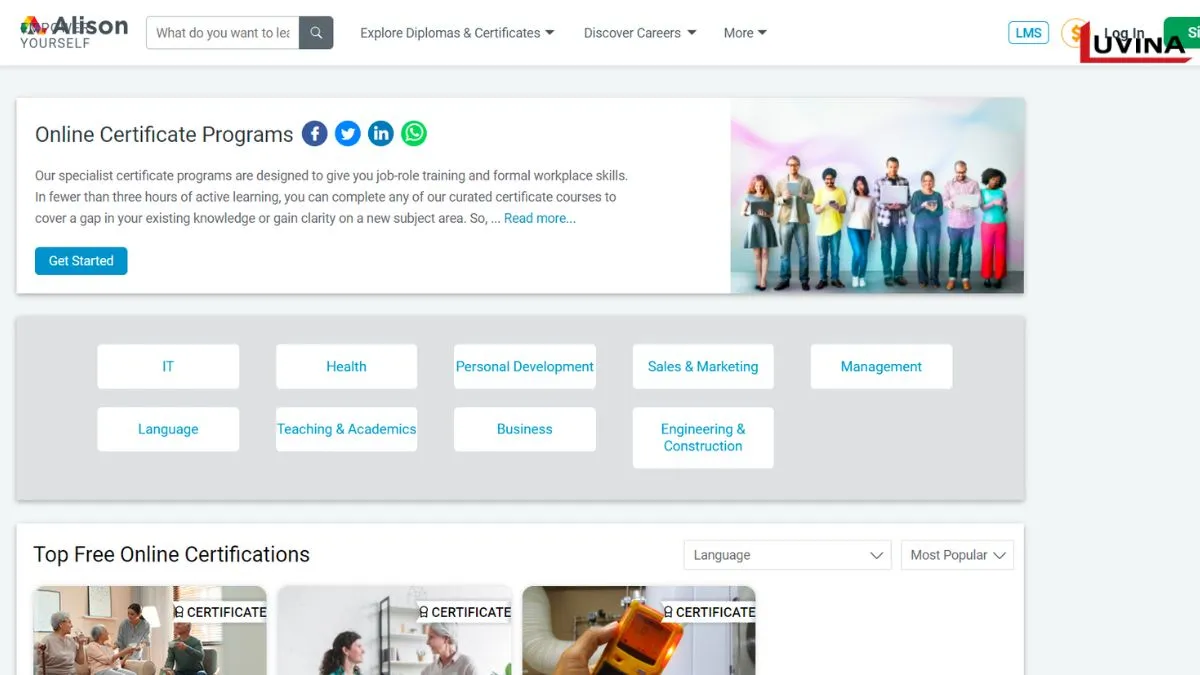
While the platform allows learners to study for free, obtaining official certificates or diplomas often requires a fee. Despite some limitations in LMS functionality, Alison remains a strong contender for individuals and organizations seeking a straightforward LMS online solution. Additionally, for course creators and entrepreneurs who wish to utilize the best LMS for selling online courses, Alison offers the ability to create and share learning content with a community of learners from all over the world.
Key features:
- – 5,500+ free courses with certification options.
- – CPD-accredited learning provider with recognized credentials
- – Quick setup up and running in minutes
- – Detailed reporting and real-time analytics to track learner progress
- – Targeted learning options, including micro-courses for specific skills.
Pros:
- – A mobile-friendly platform for flexible learning.
- – Strong focus on vocational and career-oriented courses.
- – Provides multilingual course content for a diverse learner group.
Cons:
- – Lacks advanced LMS features like in-depth customization and reporting.
- – Certificates and diplomas require payment, despite courses being free.
- – Course quality varies based on instructor expertise.
3. TalentLMS: Best for corporate training
TalentLMS is a versatile web-based LMS designed for businesses and organizations looking to implement structured and scalable training programs. As one of the most intuitive online learning management platforms, it offers a range of tools for course creation, learner engagement, and performance tracking. TalentLMS supports various content formats, including SCORM and xAPI, making it suitable for diverse learning needs. With built-in e-commerce capabilities, it also caters to businesses seeking the best LMS tools for selling training programs. While its free tier benefits small teams, advanced reporting and customization options are restricted to higher-tier plans.
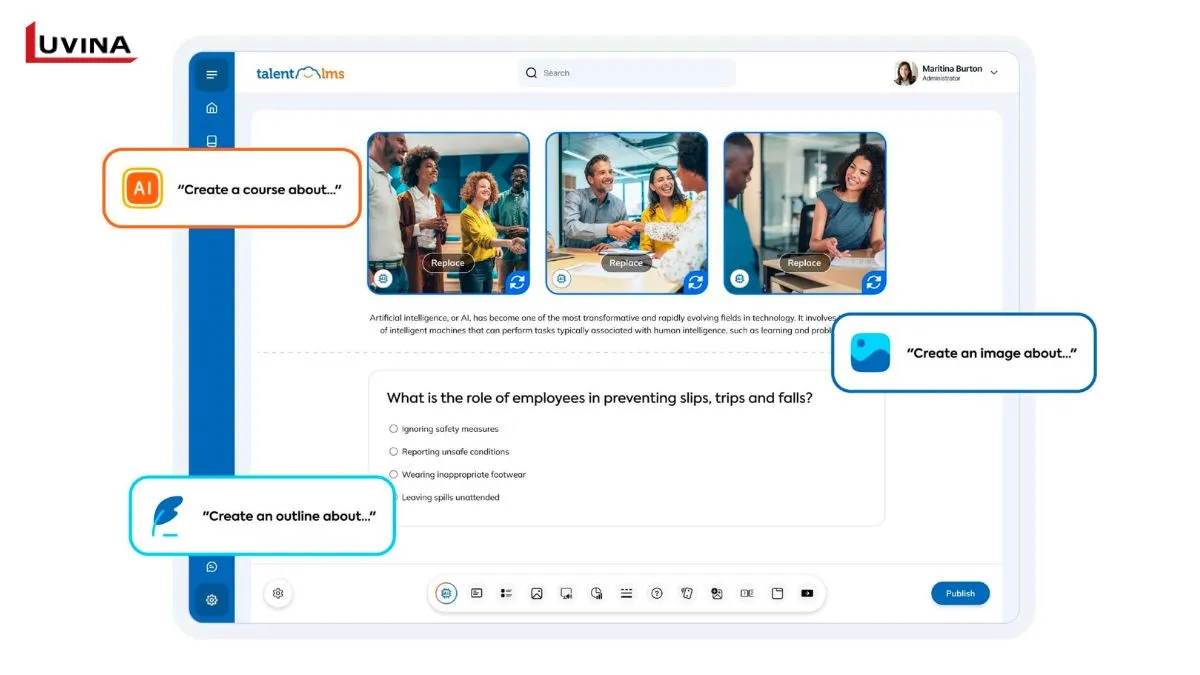
Key features:
- – Course management tools, including SCORM and xAPI support.
- – Gamification elements like badges, points, and leaderboards.
- – Built-in video conferencing integration with Zoom and GoToMeeting.
- – E-commerce functionality for selling courses via one-time payments or subscriptions.
- – Customizable themes and branding options.
- – API and third-party integrations with Salesforce, Shopify, and more.
Pros:
- – A user-friendly interface makes it very easy to create courses
- – Mobile learning enables flexibility in use
- – Strong reporting and analytics to track performance
Cons:
- – The design is not fully customizable in lower-tier plans
- – For some users, the interface of the platform is too basic.
4. Open eLMS: Best for large online courses and MOOCs
Open eLMS is a robust, open-source web LMS adopted by famous institutions like Harvard, MIT, and Microsoft. It boasts an extremely robust architecture that supports multi-institution large-scale online learning, interactive discussion, certification, and real-time data tracking, among others. As one of the most flexible online LMS platforms, Open eLMS enables institutions to integrate various kinds of content types and customize each course in pretty much every desired way.
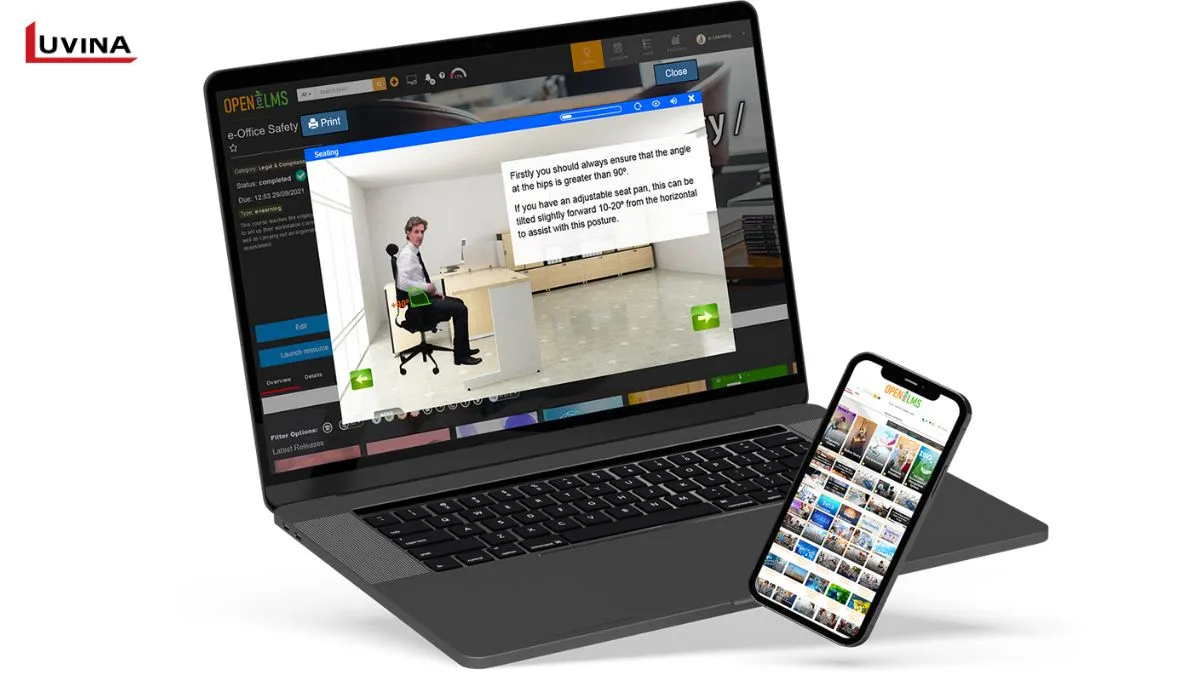
Although it is considered a free online LMS, the deployment and management of the platform require a great deal of technical expertise; hence, it is more suitable for organizations with dedicated IT support.
Key features:
- – Fully customizable open-source platform.
- – Real-time learning analytics and live data tracking.
- – Interactive forums and collaborative discussions.
- – Fully responsive design for seamless access across devices.
- – Options for certification upon course completion.
Pros:
- – Course material support: video, text, interactive
- – Official certificates are given upon course completion
- – Can support single courses and full-degree programs
Cons:
- – Requires technical expertise for setup and maintenance.
- – Platform structure can feel complex and less intuitive for new users.
5. Zoho Learn: Best for corporate training
Zoho Learn is an all-in-one intuitive safety learning management system that helps businesses create, deliver, and track training programs with ease. Part of the Zoho ecosystem, it integrates with other business tools, which further makes life easy for any company wanting to simplify employee training. Some of its features include interactive quizzes, progress tracking, and mobile accessibility to support engaging learning in Zoho Learn.
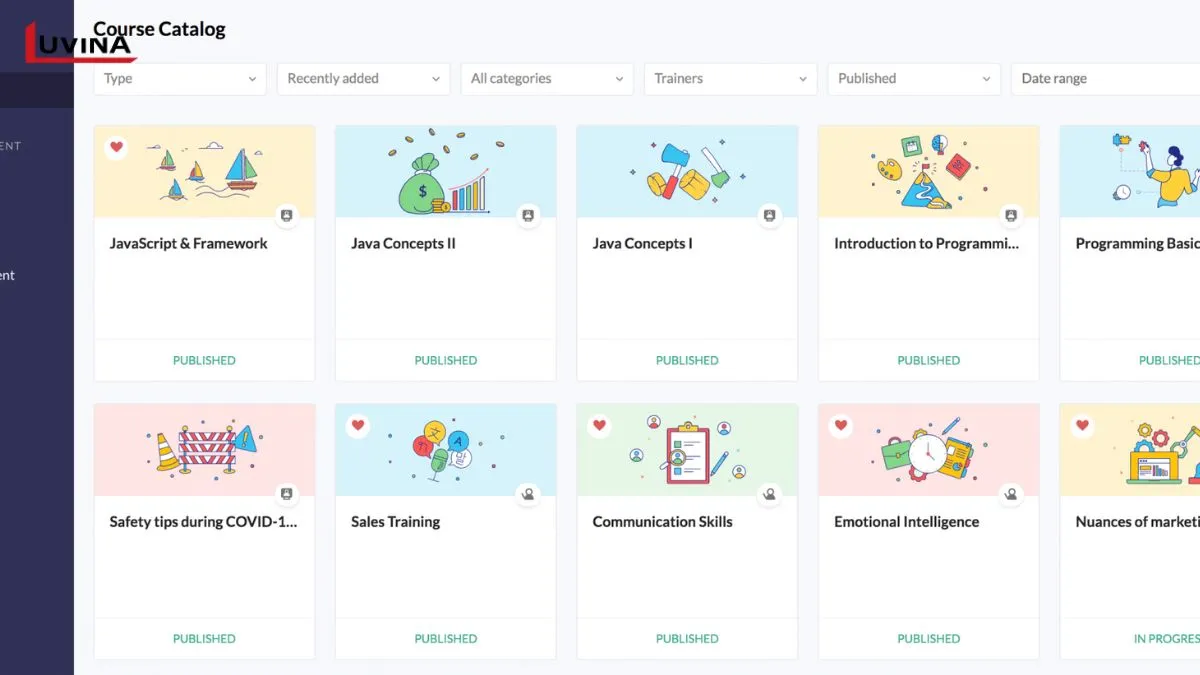
Although it’s a free LMS online, its free plan lacks so many features and user capacity, which make it ideal for small groups. In the case of wanting to scale up, Zoho Learn is one of the best online LMS options for structured corporate training.
Key features:
- – Course authoring with customizable templates.
- – Social learning features to foster collaboration.
- – Built-in course library with ready-to-use materials.
- – Assignments and progress tracking for learner assessment.
- – Mobile-friendly access for learning on the go.
Pros:
- – Seamless integration with other Zoho applications.
- – User-friendly interface with easy course management.
- – Supports interactive learning with quizzes and assessments.
Cons:
- – A free plan is limited to five users and five courses.
- – Lacks advanced features like detailed course reporting and custom portals.
6. Canvas LMS: Best for higher education and corporate training
Canvas by Instructure is a cloud-based learning management system developer that offers an LMS platform called Canvas for both instructors and institutions. It serves both the higher education market and corporate training. Its ease of use encompasses course management, communication, and grading. Due to seamless integrations with third-party applications, it is simple to keep a learning environment organized with its rigid yet flexible infrastructure. Free online LMS means it is very ideal for institutions that seek an accessible yet feature-rich platform.
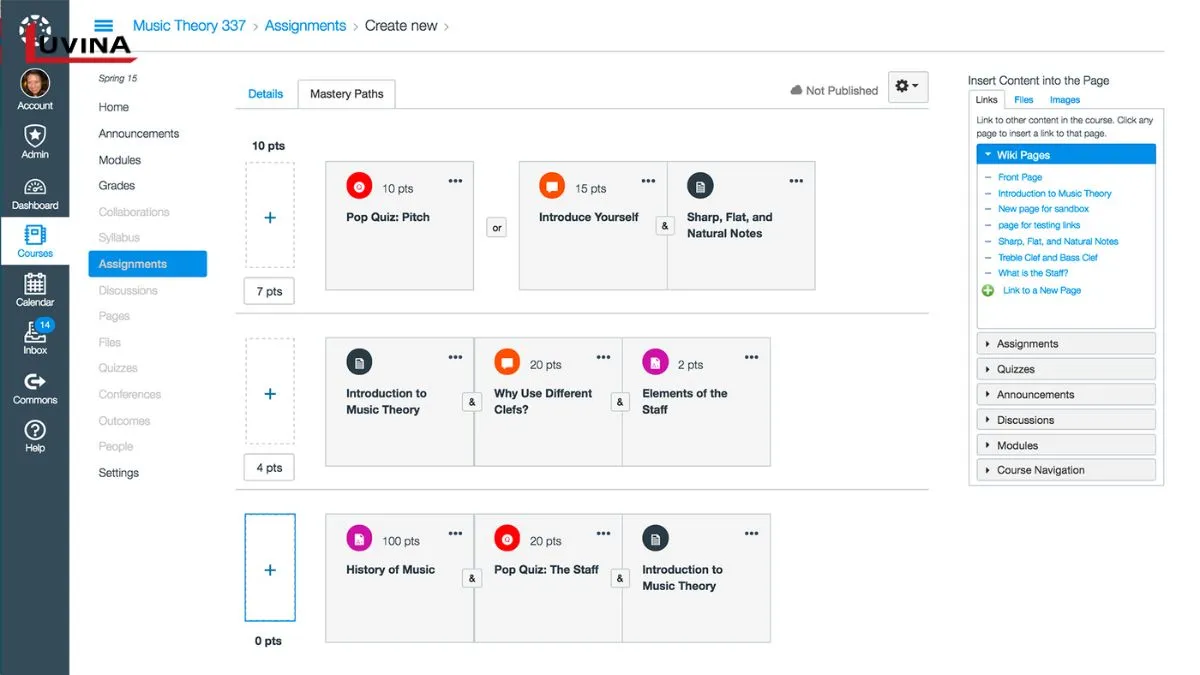
Despite its strengths, navigation can feel complex due to multiple tabs, and customization is somewhat limited in the free version. However, even now, it is one of the best LMSs for online learning, considering its ease of use and strong functionality in equal measure.
Key features:
- – Completely stable, cloud-based platform.
- – Intuitive interface and is very easy to navigate.
- – API for deeper customization and integrations.
- – No restriction on file size when uploading course material.
Pros:
- – Smooth integrations with various third-party educational tools.
- – Course design and delivery are customizable.
- – Automated event reminders and alerts, both for students and instructors.
Cons:
- – Initial setup is a bit difficult for new users.
- – Navigation might get overwhelming with so many tabs.
- – Editing and customization are a bit limited in the free version.
7. Chamilo: Best for social learning and academic activities
Chamilo is a web-based learning management system for organizations and trainers looking to achieve accessible and effective training. As an open-source LMS online platform, this allows users to create virtual campuses, manage courses, and track learner progress with ease. Chamilo includes full multimedia support, online interactive activities, and even generates certificates, thus becoming versatile in corporate and academic use.
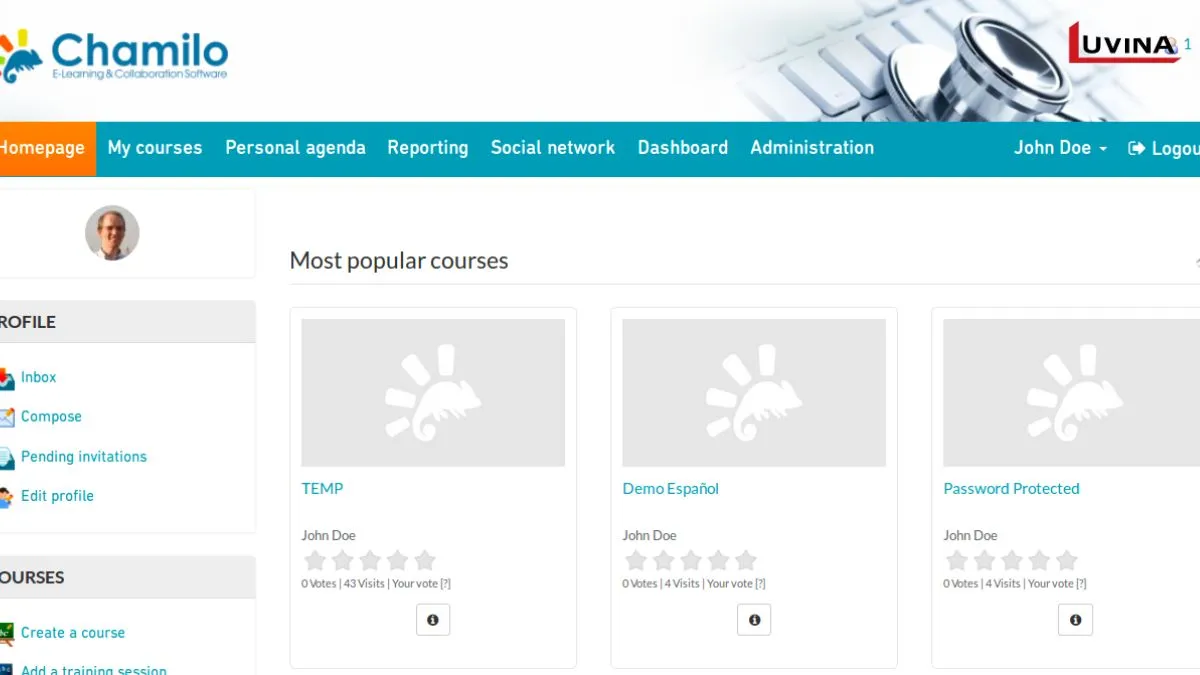
It is highly compatible with the cloud, which can support thousands of users at the same time, making it perfect for large-scale learning environments. However, limited integration options and fewer template choices may require more effort in the creation of courses. Despite the drawbacks, Chamilo remains among the best LMS websites for institutions seeking intuitive and cost-effective e-learning solutions.
Key features:
- – Creation of a virtual campus for organized training.
- – Multimedia content support, SCORM, and certification.
- – The cloud-based system handles thousands of concurrent learners.
- – Mobile compatibility: iOS and Android.
Pros:
- – User-friendly interface for seamless course management.
- – Rich feature set catering to diverse learning needs.
- – Smooth navigation and interactive learning tools.
Cons:
- – Smaller integrations with third-party solutions compared to the competition.
- – A smaller number of default templates means that most content needs to be hand-tailored.
- – Fewer customer support options.
8. Sakai: Best for academic learning and self-paced modules
Sakai is a collaborative LMS online platform that has been developed to satisfy higher education institutions and research organizations. As it is open source, a very large community of universities and developers improves the system continuously, so continuous improvements and updates are assured. It offers a flexible environment for training, learning, and knowledge-sharing, hence one of the best LMS for online courses in academic settings.
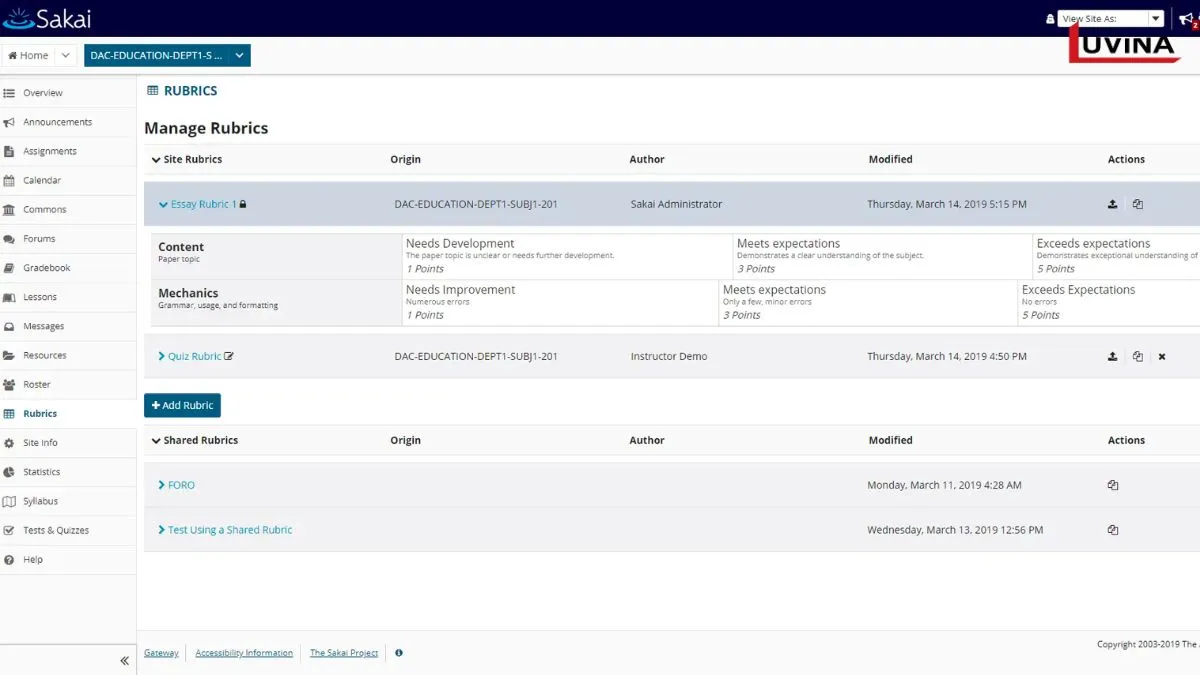
It is featured with effective collaboration tools, discussion forums, and even intelligent feedback mechanisms, while extensive customization of course content is allowed. Sakai is a free online LMS that does have certain limitations; for example, it does not save automatically, and there is some slowdown concerning performance.
Key features:
- – Fully customized lessons with quizzes, assignments, videos, and external resources.
- – Conditional release settings allow control over access to the training materials.
- – Creation of simple quizzes in a multiple-choice and fill-in-the-blank format.
- – Randomized question generation for assessments.
Pros:
- – Open-source and highly adaptable for institutional needs.
- – Strong collaboration tools, including forums and messaging.
- – An active community of users drives regular updates.
Cons:
- – No auto-save feature for assignments
- – System slowdowns may occasionally affect the user experience.
9. ATutor: Best for eLearning content
ATutor is a free web LMS to create and manage online courses. This open-source online learning management platform is one of the more economical means by which educators provide accessible eLearning content. In addition, it is also among the most accessible learning platforms that feature assistive technology for people with disabilities.
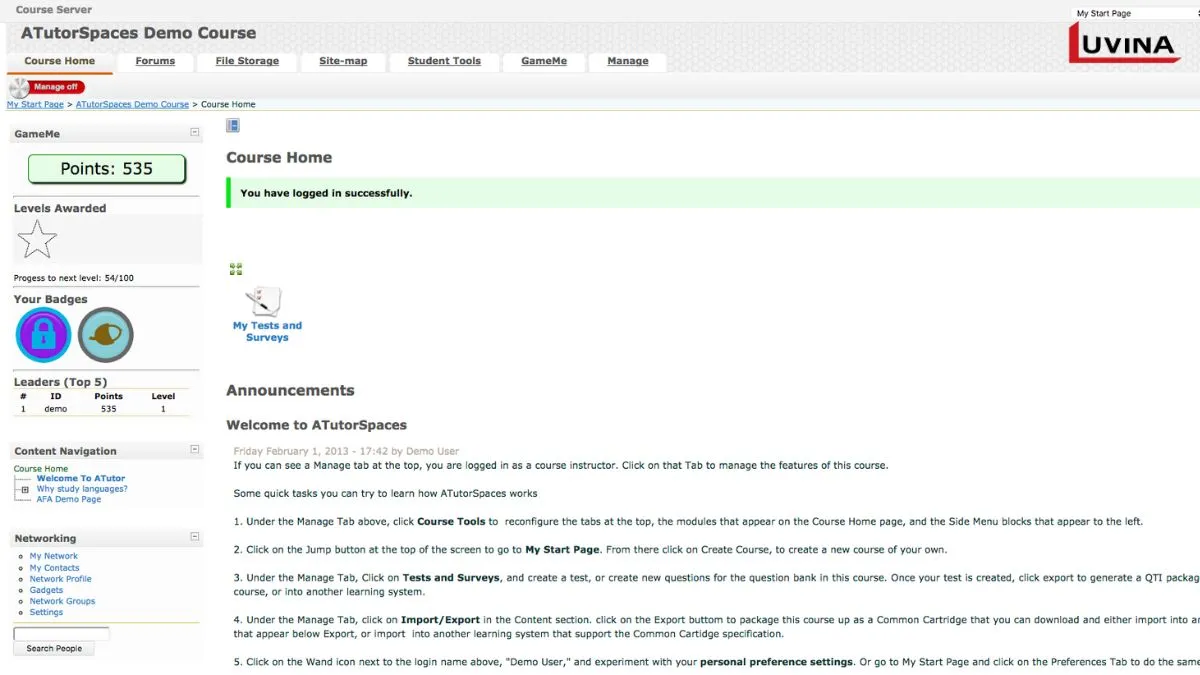
It provides a range of development tools for instructors, administrators, and learners, along with features like messaging, file storage, and progress tracking, all aimed at enhancing the learning experience. While the system is highly functional, it requires technical expertise for setup and offers limited mobile accessibility.
Key features:
- – Following the status of individual learners.
- – Creation of workgroups by hand for collaborative learning.
- – Course Creator: HTML and plain text-capable content editor.
- – Bulk emailing to learners.
- – Advanced customization by developing documentation.
Pros:
- – Easy installation and configuration for users with technical experience.
- – Available as both open and closed-source software, offering flexibility.
Cons:
- – Outdated graphical user interface (GUI), which may affect user experience.
- – Requires technical expertise for initial setup and customization.
- – No mobile access for learners or instructors.
10. ILIAS: Best for corporate training
ILIAS is a web-based LMS that offers a robust, open-source learning management system. Ideal for universities, colleges, and corporate training, this is quite popular in Europe. It is highly secure, including encryption supported by NATO, and is trusted for sensitive learning. ILIAS includes features like creating content, assessments, and collaboration, thus making it fully equipped for instructors and learners.
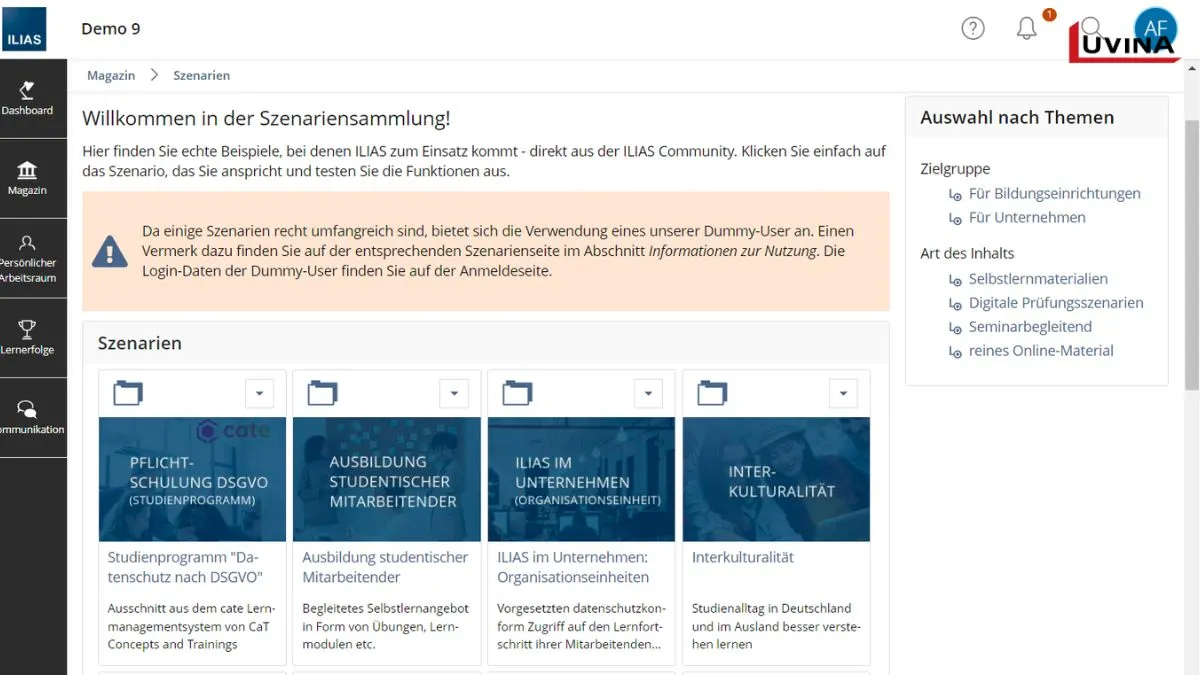
While great for an organization seeking the best LMS for selling courses, the realization of its fuller potential requires various plugins, and its interface would benefit from some modernization in design.
Key features:
- – NATO-backed security for a high level of protection for user data.
- – Ease of use, even for users who are not tech-savvy.
- – You can set up different user roles, which helps in customizing the usage of different users’ needs.
Pros:
- – Strong security measures make it a reliable choice for sensitive training data.
- – Active user community that contributes to its continuous improvement.
- – Over 13 years of development, ensuring stability and reliability.
Cons:
- – The interface design is outdated and could be more intuitive.
- – It requires multiple plugins for advanced features, which can complicate the setup process.
Conclusion
Continuous learning and skill development are essential in today’s rapidly evolving landscape. Leveraging the right free online LMS platforms can significantly transform how knowledge is delivered and received. Whether you’re an educator aiming to captivate and inspire your students or a business leader focused on empowering your team, selecting the best LMS can greatly enhance your approach.
Take action now to provide a dynamic, seamless, and engaging learning experience for your organization or institution. With Luvina’s custom learning management system development services, we help tailor your LMS to perfectly fit your specific needs. The path to creating outstanding educational journeys starts with contacting Luvina today!
Related Posts:









Read More From Us?
Sign up for our newsletter
Read More From Us?
Sign up for our newsletter